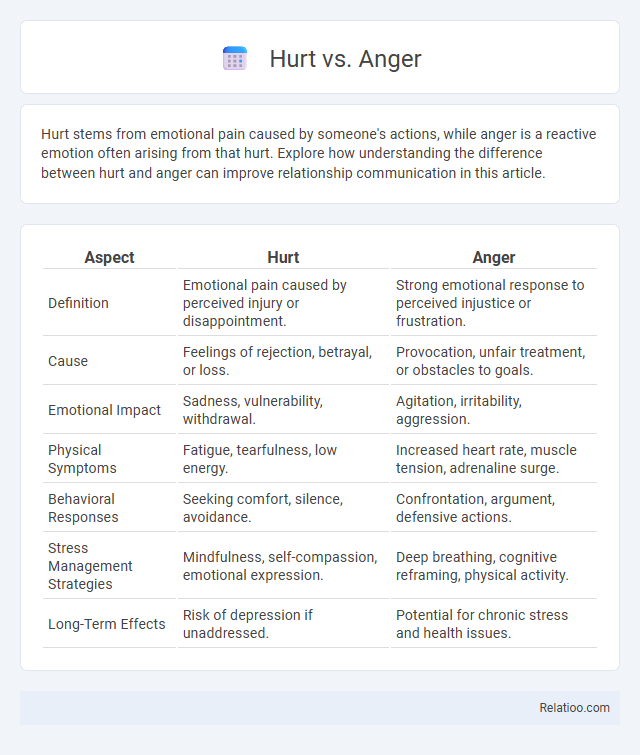Hurt stems from emotional pain caused by someone's actions, while anger is a reactive emotion often arising from that hurt. Explore how understanding the difference between hurt and anger can improve relationship communication in this article.
Table of Comparison
| Aspect | Hurt | Anger |
|---|---|---|
| Definition | Emotional pain caused by perceived injury or disappointment. | Strong emotional response to perceived injustice or frustration. |
| Cause | Feelings of rejection, betrayal, or loss. | Provocation, unfair treatment, or obstacles to goals. |
| Emotional Impact | Sadness, vulnerability, withdrawal. | Agitation, irritability, aggression. |
| Physical Symptoms | Fatigue, tearfulness, low energy. | Increased heart rate, muscle tension, adrenaline surge. |
| Behavioral Responses | Seeking comfort, silence, avoidance. | Confrontation, argument, defensive actions. |
| Stress Management Strategies | Mindfulness, self-compassion, emotional expression. | Deep breathing, cognitive reframing, physical activity. |
| Long-Term Effects | Risk of depression if unaddressed. | Potential for chronic stress and health issues. |
Understanding the Core Differences Between Hurt and Anger
Hurt stems from emotional pain caused by someone's actions or words, reflecting vulnerability and sadness, while anger arises as a response to perceived injustice or frustration, often driving you to react or defend yourself. Understanding the core differences between hurt and anger helps you recognize that hurt is more passive and internal, centered on emotional wounds, whereas anger is active and external, focused on addressing the source of pain. Recognizing these distinctions enables healthier emotional processing and more effective communication in relationships.
The Psychological Roots of Hurt Versus Anger
Hurt stems from feelings of emotional pain caused by perceived betrayal or rejection, activating vulnerability and sadness in the brain's limbic system. Anger arises as a response to threats or injustices, triggering the amygdala and increasing adrenaline to prepare for confrontation or defense. While hurt centers on internalized emotional wounding, anger focuses on externalized expressions of frustration and the need for control or justice.
How Hurt Manifests in Behavior and Emotions
Hurt manifests in behavior through withdrawal, decreased communication, and signs of vulnerability, often accompanied by emotional expressions like sadness, disappointment, and sensitivity. Unlike anger, which tends to provoke outward aggression or defensiveness, hurt usually results in quiet introspection or subdued reactions. The emotional pain caused by hurt can lead to a lowered sense of trust and increased caution in future interactions.
Recognizing the Signs of Anger in Yourself and Others
Recognizing the signs of anger in yourself and others involves observing physical cues such as clenched fists, tense muscles, and flushed skin, alongside verbal expressions like raised voices or sharp tones. Emotional triggers like frustration, disappointment, or feeling misunderstood often underpin these reactions, making self-awareness essential for managing responses effectively. Understanding these indicators helps you address conflicts calmly and fosters healthier communication and emotional regulation.
The Interplay: When Hurt Turns Into Anger
Hurt often serves as the emotional root that triggers anger when feelings of betrayal, rejection, or disappointment remain unresolved. This transformation occurs as the initial pain of hurt intensifies into defensive anger, which acts as a protective mechanism to mask vulnerability. Understanding this interplay is crucial for emotional regulation and conflict resolution, highlighting the importance of addressing the underlying hurt to prevent anger from escalating.
Impact of Hurt and Anger on Relationships
Hurt often causes emotional pain that can create distance and reduce trust in relationships, while anger can trigger confrontations and defensive behaviors that escalate conflicts. Persistent hurt may lead to withdrawal and emotional shutdown, diminishing intimacy, whereas frequent anger episodes can foster resentment and communication breakdowns. Effective management of both emotions is crucial to maintaining healthy interactions and resolving underlying issues constructively.
Communication Strategies for Addressing Hurt and Anger
Effective communication strategies for addressing hurt and anger emphasize active listening to validate feelings and foster understanding. Using "I" statements helps express emotions without blame, reducing defensiveness and promoting open dialogue. Encouraging empathy and patience creates a safe environment for resolving conflicts and rebuilding trust.
Healthy Coping Mechanisms for Hurt and Anger
Hurt and anger are emotional responses often intertwined but distinct in origin and expression; hurt arises from pain or disappointment, while anger typically stems from frustration or perceived injustice. Healthy coping mechanisms for hurt include acknowledging feelings, seeking support through conversations, and practicing self-compassion to process emotional pain constructively. Managing anger effectively involves techniques such as deep breathing, physical activity, and mindfulness to reduce impulsive reactions and promote emotional regulation.
When to Seek Professional Help for Emotional Pain
Recognizing when emotional pain like hurt or anger begins to interfere with your daily life is a key indicator to seek professional help. Persistent feelings of isolation, overwhelming sadness, or unmanageable anger that disrupt work, relationships, and overall well-being demand attention from therapists or counselors. Your mental health deserves timely support to develop healthy coping strategies and prevent long-term psychological distress.
Finding Healing: Transforming Hurt and Managing Anger
Finding healing from emotional pain requires recognizing the differences between hurt and anger, as hurt arises from feeling wounded or betrayed, while anger is a reaction to that pain. Your path to recovery involves transforming hurt by acknowledging your feelings and expressing them constructively, which helps prevent anger from escalating into destructive behavior. Managing anger effectively includes techniques such as mindfulness, deep breathing, and empathetic communication that promote emotional regulation and long-term healing.

Infographic: Hurt vs Anger
 relatioo.com
relatioo.com